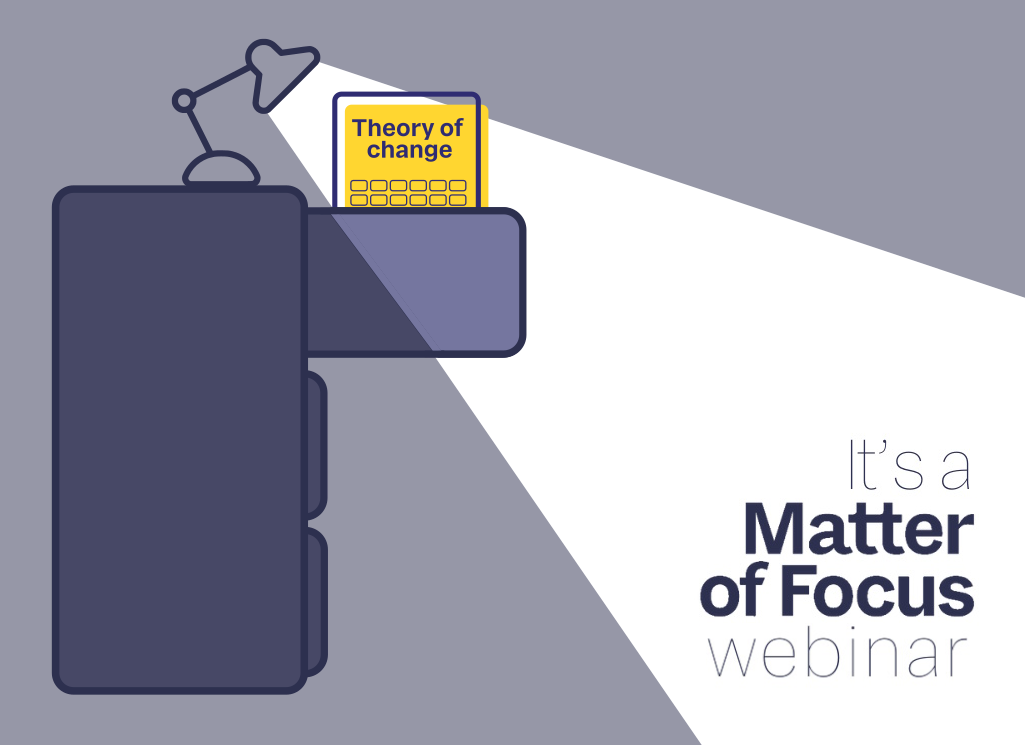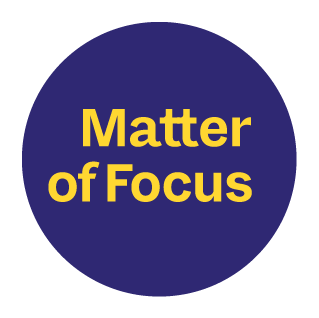
About the Matter of Focus theory of change approach
The Matter of Focus theory of change approach helps organisations and initiatives understand and explain how their work makes a difference. It maps activities through different levels of outcome to create a clear framework for communication, learning and evaluation – with people and their experiences at the centre.

Our approach has been tried and tested with many kinds of change processes, including service delivery, strategic development, change at scale, research impact and policy influencing.
If you are new to our theory of change approach, please watch our introductory webinar – you’ll find it at the bottom of this page.
About the theories of change in action spotlight webinars
- Each 30-minute spotlight webinar explores how our theory of change approach can be applied in a different area of work.
- We’re starting with three: policy influencing, relational and personal outcome focused services, and research impact.
- We will add more early next year – sign up to our emails to hear when new sessions are open for registration.
- Join one or more webinars to deepen your understanding of how a theory of change can support meaningful learning and impact.
- Recordings will be made available to everyone that registers.
- The sessions will be especially helpful for policy professionals, strategy leads, programme managers, and evaluation practitioners.
Spotlight webinar programme
Using a theory of change to understand and capture the impact of policy influencing work (watch now)
→ Watch this policy influencing spotlight session
About this spotlight webinar
Policy influencing work is often complex and long-term. In this theory of change in action spotlight session, Sarah Morton shows how a theory of change can help you understand and demonstrate the impact of influencing and advocacy activities.
Sarah takes you through an example theory of change for policy influencing work, and how it can be used to help shape data collection to demonstrate policy impact. She shares ideas for getting data when formal feedback is not appropriate or possible.
By the end of this session, you will have:
- insight into using a theory of change to track policy influencing work
- an example framework for tracking policy influencing work
- practical ideas for collecting data that you can try yourself.
→ Watch the policy influencing spotlight session
If you are new to theories of change, you might like to watch our introductory webinar before watching this one. You’ll find the introductory webinar at the bottom of this page.
Using a theory of change to evaluate relational and personal outcome focused services (5 November 2025)
- Wednesday, 5 November 2025
- 12.30–1.00pm (GMT)
Theories of change are a tried and tested tool to support the evaluation of relational services that are focused on improving outcomes for people.
Used well, theories of change help everyone involved hold a shared vision for how flexible, responsive services make a difference – and what needs to be in place for this to happen. A good theory of change can support good practice and help capture the impact of your work.
In this theories of change in action spotlight session, we’ll share an example theory of change that can be used to track the impact of a relational, asset based, personal outcome focused service. We’ll share good practice in using administrative data to support evaluation and some ideas for addressing common data gaps. We will also talk about how taking an embedded approach to evaluation can help build a culture of reflective practice and learning.
By the end of this session, you will have:
- insight into using a theory of change to capture the impact of your relational service
- access to a template evaluation framework and some practical approaches to collecting data that you can try yourself
- Ideas for embedding evaluation into everyday work.
To get the most from this session
If you are new to our approach to theories of change, we encourage you to watch our introductory webinar before attending, because we’ll be jumping straight into a worked example without going into the detail behind it. You’ll find the introductory webinar at the bottom of this page.
Using a theory of change to track the impact of your research (3 December 2025)
- Wednesday, 3 December 2025
- 12.30–1.00pm (GMT)
It can be hard to show how research makes a difference. Impact often takes time, happens through other people, and isn’t always easy to trace. But a good theory of change can help.
In this session we’ll show how a theory of change can be used to map out and measure the pathways from research to real-world impact. We’ll share a practical example that can help you build a strong case for how your work is making a difference — whether you’re applying for funding, reporting to a stakeholder or for the REF, or planning your next project.
We’ll also share ways of using your theory of change to help shape engagement and communication activities, so you can support research use and increase your chances of impact.
By the end of this session, you will have:
- insight into using a theory of change to plan for and track research impact
- access to a template evaluation framework to assess research impact
- ideas for capturing evidence of use and influence in a range of settings.
To get the most from this session
If you are new to our approach to theories of change, we encourage you to watch our introductory webinar before attending, because we’ll be jumping straight into a worked example without going into the detail behind it. You’ll find the introductory webinar at the bottom of this page.
New to our theory of change approach?
If you are new to our theory of change approach, we encourage you to watch our introductory webinar before attending our spotlight webinars, because we’ll be jumping straight into a worked example without going into the detail behind it.
